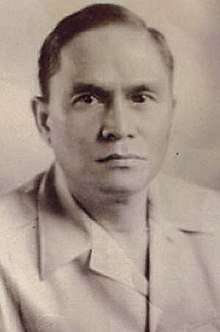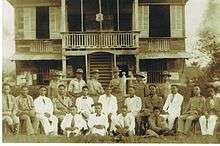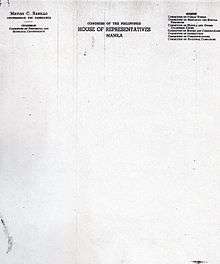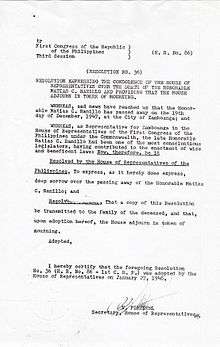Matias Ranillo Sr.
Matias Castillon Ranillo Sr. was a Governor of then Province of Zamboanga and later Congressman of the lone Legislative District of Zamboanga during the 1st Congress of the Commonwealth of the Philippines.[1] During the Japanese occupation in World War II, he was made Military Governor of the province.
Matias Castillon Ranillo Sr. | |
|---|---|
 Hon. Ranillo, post-war | |
| Member of the Philippine House of Representatives from Province of Zamboanga's Lone Legislative District | |
| In office 1941–1946 | |
| Preceded by | Juan S. Alano |
| Succeeded by | Juan S. Alano (1st Congress of the Philippines) |
| Governor of the Province of Zamboanga | |
| In office 1937–1940 | |
| Preceded by | Felipe Ramos |
| Succeeded by | Felipe Azcuna |
| Personal details | |
| Born | February 28, 1898 Dipolog, Zamboanga Peninsula, Captaincy General of the Philippines |
| Died | December 18, 1947 (aged 49) Zamboanga City, Zamboanga, Philippines |
| Children | Matias Ranillo Jr. |
| Parents | Primo Ranillo and Laureana Castillon |
Early life and career
Ranillo was born February 28, 1898 to Primo Ranillo and Laureana Castillon in Dipolog, Zamboanga Peninsula. Handsome and bright, he was the only candidate from the Manila Law College to pass the Philippine Bar Examinations in 1926. A very articulate lawyer, he then became a judge in Basilan.[1]
Political career
Ranillo was elected Governor of the Province of Zamboanga in 1937. In 1939, he was present when President Manuel L. Quezon and his daughters Zenaida and Aurora "Baby" inaugurated the first bridge linking Dipolog and Dapitan, now called the Quezon Bridge.[2] He also welcomed then-Vice-President Sergio Osmena when the latter inaugurated Dipolog Airport in October 1941, who came in on board a Philippine Army Air Corps flight and almost crashed at landing. They immediately proceeded to Dipolog Cathedral to have a Thanksgiving mass for landing safely.[3]

Japanese occupation
Already an elected assemblyman at the outbreak of World War II in Manila on December 7, 1941, he was captured by the Japanese and later recaptured and imprisoned by the American forces on June 1942. He was subsequently released in December 1942 and was appointed civilian governor of the Province of Zamboanga under the auspices of the US Tenth Military District. During this time, he ensured that the people Zamboanga did not starve as much by conducting a food production campaign and coordinating with other Filipino guerilla-controlled areas to allow necessary supplies to flow to the peninsula. His efforts also provided American and Filipino troops refuge and staging area for the liberation of the peninsula from the Japanese occupation.[4]

Family
Ranillo married Sotera Colana Kaper and had children named Virginia Ranillo - Papa and Matias Ranillo Jr. (died in 1969). He has grandchildren named Mat Ranillo III, Suzette Ranillo, and a great-grandchild named Krista Ranillo.
Death
Due to his imprisonment and continued work in harsh mountainous environments as civilian governor, Ranillo's health deteriorated rapidly. To avoid capture, he had to move his government seat month after month through mountains and rivers, often on wet clothes. Nevertheless, he continued on with his food production campaign and finally, his ill health led to his untimely death on December 18, 1947 at the age of 49 at Brent Hospital in Zamboanga City. His remains were brought back to his hometown Dipolog for burial.[4]

Legacy
- A street in Dipolog, originally named Lincoln Street, from the corner of Quezon Avenue in Barangay Central (facing the entrance gate of the Dipolog Central Public Market) to Dipolog Boulevard is named Ranillo Street.
- In 2012, a movement was started, spearheaded by Ranillo's daughter, Virginia Ranillo - Papa, to propose the renaming of the Dipolog Airport to Matias Castillon Ranillo Airport, to recognize his efforts and sacrifices for his hometown and the peninsula. [4]
References
- "MAT'S FAMILY HISTORY". Dipolognon.com.
- "Quezon Bridge". Dipolog.com. Retrieved 9 January 2016.
- "Airports of Interest". 20th Century Aviation Magazine.com. Retrieved 9 January 2016.
- Virginia Ranillo-Papa (18 December 2012). "Proposed Resolution Renaming Airport to Matias Castillon Ranillo Airport". Facebook.com. Retrieved 10 January 2016.
Related Links
- "Matias Castillon Ranillo Sr". Geni.com.